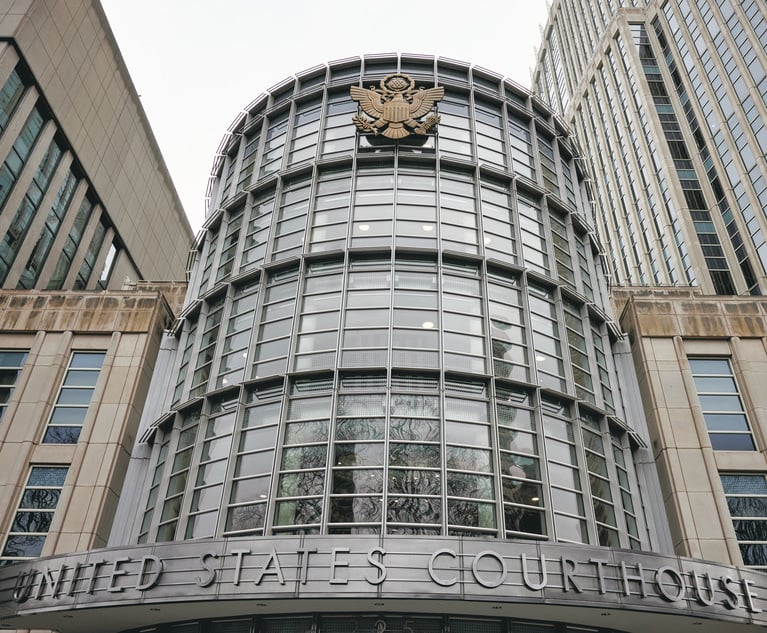Law Schools Adopt Pass-Fail Grades as They Move Online Amid COVID-19
At least five highly ranked law schools have said they are moving to pass/fail grading this semester—a change that could disrupt the normal law firm summer associate hiring process.
March 18, 2020 at 02:15 PM
6 minute read
The original version of this story was published on Law.com
 Photo: Shutterstock.
Photo: Shutterstock.
Several top law schools this week have announced switching to pass/fail grading for the spring semester, now that courses and exams are being delivered online amid the coronavirus pandemic. And many law school administrators have told students they are weighing changes to grading procedures and plan to announce such decisions in the coming days.
Thus far, Stanford Law School; Harvard Law School; the University of Michigan Law School; the University of California, Berkeley School of Law; and Cornell Law School have said they have adopted what is effectively a pass/fail system—the names vary by campus—or are giving students the option to have their grades issued as a pass or fail for the current semester. All American Bar Association-accredited law schools are now holding classes online, or will soon begin online classes.
The move to pass/fail grading is a dramatic shift for law schools, where grades play a large role in employment opportunities and co-curricular activities such as eligibility for law review, especially for first-year students. Mandatory curves are staples of law school grading systems and many students pay close attention to their class rank—which is determined by grade-point averages.
Gavin White, the global hiring partner at Skadden, Arps, Slate, Meagher & Flom, said any widespread switch to pass/fail grades for the spring would hamper the law firm summer associate hiring process unless on-campus recruiting was pushed back.
"Unless we change the timetable for hiring, you are hiring off of one semester of grades," he said. "That probably hurts the students who have a less-than-stellar first semester, but otherwise would have been able to show an improvement for the second semester. They are sort of being robbed of that opportunity. That's something we look at at—particularly students who don't come from a privileged background may have a slower start at law school, but they figure it out in the second semester."
It's worth noting that several of the schools that have moved to pass/fail grading do not normally issue letter grades, instead having modified systems that offer three or four grade categories. Law students are dealing with unprecedented amounts of upheaval at the moment, and the exams administered online don't have the same level of security as those given in person, administrators have argued.
Cornell Law School is among the first to make the move. A memo to the faculty issued March 16 informed them that all spring classes will be graded as either satisfactory or unsatisfactory, regardless of their original grading designation.
"All transcripts will be annotated to indicate that spring 2020 grades reflect the law school policy in response to the current public health emergency rather than student choice," the memo stated. "Grades for spring 2020 will not figure in any student's cumulative merit point ratio, nor will the law school calculate or distribute end-of-academic year rankings this academic year for first-year students."
Stanford Law School, which operates on the quarter system, is in the midst of final exams for its winter quarter. Dean Jenny Martinez emailed students to tell them that the exam period had been extended through March 29 and that all grades for the quarter would be graded on a "mandatory pass" basis. That announcement came the same day as Bay Area residents were ordered to shelter in place.
"In light of the fact that some people have already taken exams over the last few days, some are in the middle of taking an exam today as this news is breaking, and others may now have weeks more to study, with substantially different disruptions in the next two weeks based on whether people are staying here on or off campus confined to their rooms or apartments, traveling to other parts of the country or globe in the next few days, etc., all exam classes for Winter Quarter will be graded on an MP basis," Martinez wrote.
Harvard Law and Michigan Law are taking a slightly different approach. The schools are giving students the option to receive their spring grades in the pass/fail format.
Berkeley Law dean Erwin Chemerinsky emailed students Tuesday to inform them of the mandatory shift to pass/fail grading, noting that many students and faculty lobbied for that approach. He called it the "fairest, most compassionate, and most equitable" way to move forward with grading under the circumstances.
"Many in our community have been—or I fear will be—dislocated, or have unexpected family care responsibilities, or have health issues to deal with," Chemerinsky wrote. "At this moment, it is hard to imagine how this will develop and how many will be affected in what ways. Two weeks ago, I could not have imagined where we are now. Also, the shift to distance learning understandably has caused anxiety and will affect students differently."
Employers will understand the lack of grades under the circumstances, Chemerinsky added.
Cornell Law's faculty memo acknowledged the drawbacks to adopting a pass/fail system. One is that students might not prepare as diligently for exams as they would otherwise. Another is the issue that White, the Skadden partner, raised about students who might have improved in the second semester.
"We do sympathize with those students who would have done better in second semester than first, but we cannot accommodate that concern without incurring still greater costs," the memo reads. "We hope to mitigate the harm somewhat by including a notation on transcripts and not calculating cumulative rank at the end of the current academic year."
With many other law schools examining potential grading changes, it's possible that some will retain letter grades and others will go to pass/fail—a split outcome that could make the hiring picture murkier for law firm employers, White said. That makes a strong case for moving the summer associate recruiting process back, he said.
"If you only have one semester of grades, it's hard to get a meaningful and realistic assessment of someone's academic performance," White said. "What I would really like to see is schools move on-campus interviews into January and February, where we would have 2L fall grades."
NOT FOR REPRINT
© 2025 ALM Global, LLC, All Rights Reserved. Request academic re-use from www.copyright.com. All other uses, submit a request to [email protected]. For more information visit Asset & Logo Licensing.
You Might Like
View All
The Met Hires GC of Elite University as Next Legal Chief

NY Appellate Panel Cites Student's Disciplinary History While Sending Negligence Claim Against School District to Trial

'No Evidence'?: Big Law Firms Defend Academic Publishers in EDNY Antitrust Case
3 minute read
'Substantive Deficiencies': Judge Grants Big Law Motion Dismissing Ivy League Price-Fixing Claims
3 minute readLaw Firms Mentioned
Trending Stories
- 1'A Death Sentence for TikTok'?: Litigators and Experts Weigh Impact of Potential Ban on Creators and Data Privacy
- 2Bribery Case Against Former Lt. Gov. Brian Benjamin Is Dropped
- 3‘Extremely Disturbing’: AI Firms Face Class Action by ‘Taskers’ Exposed to Traumatic Content
- 4State Appeals Court Revives BraunHagey Lawsuit Alleging $4.2M Unlawful Wire to China
- 5Invoking Trump, AG Bonta Reminds Lawyers of Duties to Noncitizens in Plea Dealing
Who Got The Work
J. Brugh Lower of Gibbons has entered an appearance for industrial equipment supplier Devco Corporation in a pending trademark infringement lawsuit. The suit, accusing the defendant of selling knock-off Graco products, was filed Dec. 18 in New Jersey District Court by Rivkin Radler on behalf of Graco Inc. and Graco Minnesota. The case, assigned to U.S. District Judge Zahid N. Quraishi, is 3:24-cv-11294, Graco Inc. et al v. Devco Corporation.
Who Got The Work
Rebecca Maller-Stein and Kent A. Yalowitz of Arnold & Porter Kaye Scholer have entered their appearances for Hanaco Venture Capital and its executives, Lior Prosor and David Frankel, in a pending securities lawsuit. The action, filed on Dec. 24 in New York Southern District Court by Zell, Aron & Co. on behalf of Goldeneye Advisors, accuses the defendants of negligently and fraudulently managing the plaintiff's $1 million investment. The case, assigned to U.S. District Judge Vernon S. Broderick, is 1:24-cv-09918, Goldeneye Advisors, LLC v. Hanaco Venture Capital, Ltd. et al.
Who Got The Work
Attorneys from A&O Shearman has stepped in as defense counsel for Toronto-Dominion Bank and other defendants in a pending securities class action. The suit, filed Dec. 11 in New York Southern District Court by Bleichmar Fonti & Auld, accuses the defendants of concealing the bank's 'pervasive' deficiencies in regards to its compliance with the Bank Secrecy Act and the quality of its anti-money laundering controls. The case, assigned to U.S. District Judge Arun Subramanian, is 1:24-cv-09445, Gonzalez v. The Toronto-Dominion Bank et al.
Who Got The Work
Crown Castle International, a Pennsylvania company providing shared communications infrastructure, has turned to Luke D. Wolf of Gordon Rees Scully Mansukhani to fend off a pending breach-of-contract lawsuit. The court action, filed Nov. 25 in Michigan Eastern District Court by Hooper Hathaway PC on behalf of The Town Residences LLC, accuses Crown Castle of failing to transfer approximately $30,000 in utility payments from T-Mobile in breach of a roof-top lease and assignment agreement. The case, assigned to U.S. District Judge Susan K. Declercq, is 2:24-cv-13131, The Town Residences LLC v. T-Mobile US, Inc. et al.
Who Got The Work
Wilfred P. Coronato and Daniel M. Schwartz of McCarter & English have stepped in as defense counsel to Electrolux Home Products Inc. in a pending product liability lawsuit. The court action, filed Nov. 26 in New York Eastern District Court by Poulos Lopiccolo PC and Nagel Rice LLP on behalf of David Stern, alleges that the defendant's refrigerators’ drawers and shelving repeatedly break and fall apart within months after purchase. The case, assigned to U.S. District Judge Joan M. Azrack, is 2:24-cv-08204, Stern v. Electrolux Home Products, Inc.
Featured Firms
Law Offices of Gary Martin Hays & Associates, P.C.
(470) 294-1674
Law Offices of Mark E. Salomone
(857) 444-6468
Smith & Hassler
(713) 739-1250






